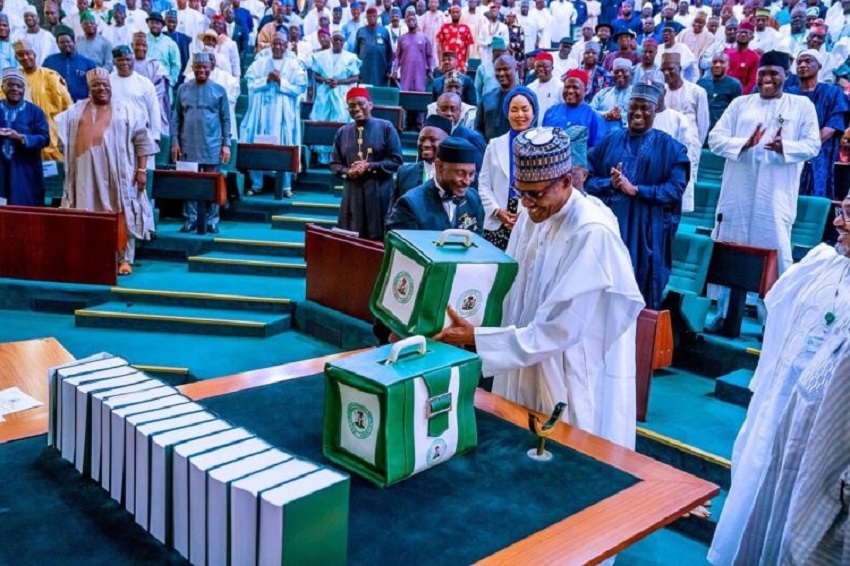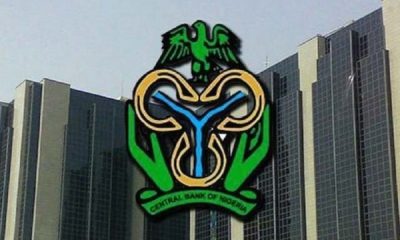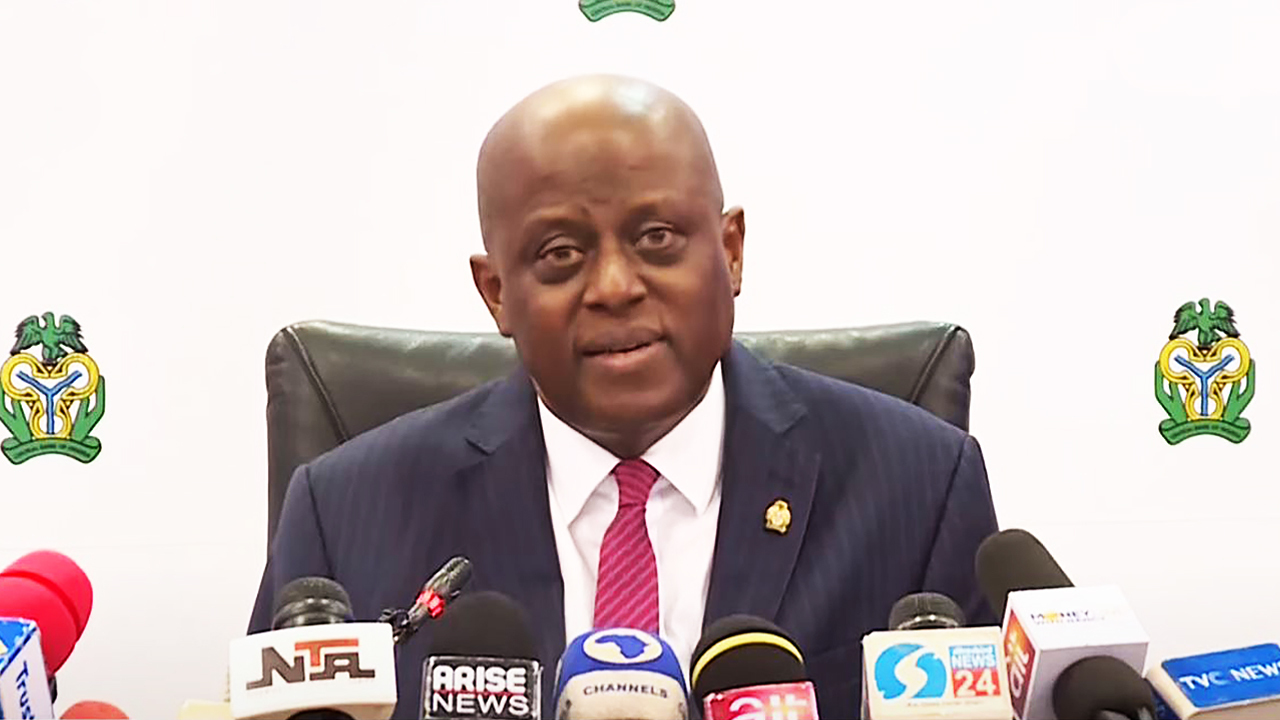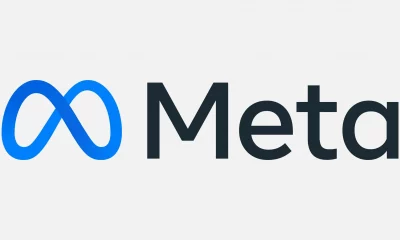General
SERAP Demands Probe of 316 Duplicated Projects in 2021 Budget

By Adedapo Adesanya
The Socio-Economic Rights and Accountability Project (SERAP) has asked President Muhammadu Buhari to probe the duplication of 316 projects in the 2021 budget he signed into law in December 2020.
SERAP made the request via a statement issued on Sunday by its Deputy Director, Mr Kolawole Oluwadare. The group also asked Mr Buhari to direct the Minister of Justice, Mr Abubakar Malami, to carry out the investigation.
The organisation wants the Minister to also “investigate ministries, departments and agencies (MDAs) and members of the National Assembly suspected to be responsible for inserting N39.5 billion” for the 316 duplicated projects.
“Any such investigation should establish whether public funds have been mismanaged, diverted or stolen in the guise of implementing the duplicated and mysterious projects,” the statement also demanded.
“Anyone suspected to be responsible should face prosecution as appropriate, if there is sufficient admissible evidence, and any stolen public funds should be fully recovered,” it added.
According to SERAP, the misallocation of public funds for duplicated and mysterious projects has seriously undermined the ability of the indicted MDAs, noting that the government should ensure respect for Nigerians’ human rights through developing and implementing well-thought-out policies, plans, and budgets.
It also expressed concerns that the N39.5 billion duplicated and mysterious projects may have been used as a ploy to divert and steal vital resources from MDAs.
The statement added, “Budget allocations and expenditure ought to be well-suited to ensure access of Nigerians to basic public services, and responsive to the people’s needs in order to prevent corruption or unnecessary or wasteful spending.”
Business Post reports that last week, an organisation known as BudgIT revealed that there were 316 duplicated capital projects worth N39.5 billion in the 2021 budget worth N13.588 trillion.
The ministries reportedly involved in the duplicated and mysterious projects are Ministry of Health with 115 projects; Ministry of Information and Culture with 40 projects; Ministry of Agriculture and Rural Development with 25 projects; Ministry of Education with 23 projects; Ministry of Transportation with 17 projects; and Ministry of Science and Technology with 17 projects.
“Others are the Ministry of Environment with 13 projects; Ministry of Power with 11 projects; Ministry of Labour and Employment with 11 projects, and Ministry of Water Resources with 10 projects.
For SERAP, this development suggests a grave violation of the public trust and Nigerians’ rights to education, health, water, sanitation, and a clean and satisfactory environment because the indicted MDAs have misallocated public funds at the expense of the people’s access to basic public services, and enjoyment of rights.
The group informed the President that “investigating and prosecuting any allegations of mismanagement, diversion and stealing of public funds budgeted for the 316 duplicated and mysterious projects would allow your government to use the budget to effectively promote Nigerians’ access to essential public goods and services.”
“It would also enable your government to meet Nigeria’s human rights obligations in the way the MDAs under your leadership and supervision allocate, spend and audit the budget,” it added.
“Publishing the ‘implementation status’ of the duplicated and mysterious projects would allow Nigerians to hold their government to account in the spending of public funds. This is particularly true for marginalized and excluded groups, such as people living in poverty, women, children, and persons with disabilities, as the budget has a disproportionate impact on their welfare.”
“We would be grateful if the recommended measures are taken within 14 days of the receipt and/or publication of this letter. If we have not heard from you by then, the Incorporated Trustees of SERAP shall take all appropriate legal actions to compel your government to comply with our request in the public interest.”
“The revelations also suggest that the indicted MDAs lack transparent, accountable, effective and credible budgeting processes to prevent and combat corruption. SERAP is concerned that the Federal Government has not complied with Nigeria’s obligations under international human rights law,” SERAP said.
Also, it urged the Minister of Finance Budget and National Planning, Mrs Zainab Ahmed, to publish full details of the current implementation status of the duplicated and mysterious projects, adding that, “any spending on the projects to date, including the 115 projects inserted in the budget of the Ministry of Health; the 23 projects inserted in the budget of the Ministry of Education, and 10 projects inserted in the budget of the Ministry of Water Resources.”
General
Nigerian Bottling Company Bridges Education, Employability Gap

By Modupe Gbadeyanka
The Nigerian Bottling Company (NBC) has reaffirmed its determination to bridge the gap between education and employability in the country by sustaining its flagship Youth Empowered (YE) programme.
This initiative provides hands-on learning, real-world insights, and access to career-shaping opportunities to young Nigerians.
The 2026 edition of the scheme commenced on February 2 at the University of Lagos (UNILAG), with participants mainly young people between the ages of 16 and 35.
A statement from the organisation said this year’s rollout will expand to more tertiary institutions, including the Federal University of Technology, Akure (FUTA). This follows a successful 2025 tour that reached seven cities across the country, including Makurdi, Jos, Benin, Kaduna, Asaba, Akure, and Port Harcourt.
Participants in the 2026 programme will receive training across key modules designed to support personal, professional, and business growth, including Business Life Skills, Adaptability and Resilience, Financial Literacy, Customer Service and Communication, Sales and Negotiation Skills, and Workplace Ethics.
The sessions will also feature breakout workshops on Business Planning, Project Management, and Time Management, alongside the Director’s Grant Pitch Competition, where participants can pitch their ideas for a chance to win business funding.
In addition to skills development, NBC’s People and Culture team will be present throughout the programme to identify outstanding talent for future opportunities within the organisation, further strengthening the connection between learning, employment, and long-term career growth.
One of the participants at the UNILAG training, Waliat Adedogun, who received a cash grant through the Director’s Grant Pitch Competition to support her small business, said: “Youth Empowered gave me more than training; it gave me clarity and confidence. Winning the grant means I can finally take my business idea from a dream into something real. I now feel prepared to build, grow, and create opportunities not just for myself, but for others too.”
Since its launch in 2017, the scheme has impacted more than 70,000 young Nigerians, equipping participants with practical skills, confidence, and exposure needed to succeed in today’s dynamic workplace and entrepreneurial landscape.
This year’s programme is being delivered in collaboration with Fate Foundation as the implementing partner, with funding support from The Coca-Cola HBC Foundation.
Last year, 10 beneficiaries were selected for six-month paid internships across NBC locations in Lagos, Ibadan, Asejire, and Challawa, gaining direct industry exposure.
Additionally, three outstanding participants received sponsorship for an all-expenses-paid intensive culinary training programme and were awarded N1 million each to support the launch of their businesses.
General
INEC Fixes February 20 for 2027 Presidential, NASS Elections

By Modupe Gbadeyanka
The 2027 presidential and National Assembly elections will take place on Saturday, February 20, the Independent National Electoral Commission (INEC) has revealed.
In a notice for the 2027 general polls issued on Friday, the electoral umpire also disclosed that the governorship and state assembly elections for next year would be on Saturday, March 6.
Speaking at a news briefing in Abuja today, the chairman of INEC, Mr Joash Amupitan, expressed the readiness of the commission to conduct the polls next year, which is 12 months away.
The timetable issued by the organisation for the polls comes when the federal parliament has yet to transmit the amended electoral bill to President Bola Tinubu for assent.
This week, the Senate passed the electoral bill, reducing the notice of elections from 360 days to 180 days, while the transmission of results was mandated with a proviso.
Recall that on February 4, INEC said it was ready to go ahead with preparations for the elections despite the delay in the passage of the amended electoral law of 2022.
General
NGIC Pipeline Network to Experience 4-Day Gas Supply Shortage

By Modupe Gbadeyanka
The pipeline network of the NNPC Gas Infrastructure Company Limited (NGIC) will witness a temporary reduction in gas supply for four days.
This information was revealed by the Chief Corporate Communications Officer of the Nigerian National Petroleum Company (NNPC) Limited, Mr Andy Odeh, in a statement on Thursday night.
A key supplier of gas into the NGIC pipeline network is Seplat Energy Plc, a joint venture partner of the state-owned oil agency.
It was disclosed that the facility would undergo routine maintenance from Thursday. February 12 to Sunday, February 15, 2026.
The NNPC stated that, “This planned activity forms part of standard industry safety and asset integrity protocols designed to ensure the continued reliability, efficiency, and safe operation of critical gas infrastructure.”
“Periodic maintenance of this nature is essential to sustain optimal system performance, strengthen operational resilience, and minimise the risk of unplanned outages,” it added.
“During the four-day maintenance period, there will be a temporary reduction in gas supply into the NGIC pipeline network. As a result, some power generation companies reliant on this supply may experience reduced gas availability, which could modestly impact electricity generation levels within the timeframe.
“NNPC Ltd and Seplat Energy are working closely to ensure that the maintenance is executed safely and completed as scheduled. In parallel, NNPC Gas Marketing Limited (NGML) is engaging alternative gas suppliers to mitigate anticipated supply gaps and maintain stability across the network,” the statement further said.
“Upon completion of the maintenance exercise, full gas supply into the NGIC system is expected to resume promptly, enabling affected power generation companies to return to normal operations,” it concluded.
-

 Feature/OPED6 years ago
Feature/OPED6 years agoDavos was Different this year
-
Travel/Tourism10 years ago
Lagos Seals Western Lodge Hotel In Ikorodu
-

 Showbiz3 years ago
Showbiz3 years agoEstranged Lover Releases Videos of Empress Njamah Bathing
-

 Banking8 years ago
Banking8 years agoSort Codes of GTBank Branches in Nigeria
-

 Economy3 years ago
Economy3 years agoSubsidy Removal: CNG at N130 Per Litre Cheaper Than Petrol—IPMAN
-

 Banking3 years ago
Banking3 years agoSort Codes of UBA Branches in Nigeria
-

 Banking3 years ago
Banking3 years agoFirst Bank Announces Planned Downtime
-

 Sports3 years ago
Sports3 years agoHighest Paid Nigerian Footballer – How Much Do Nigerian Footballers Earn



















